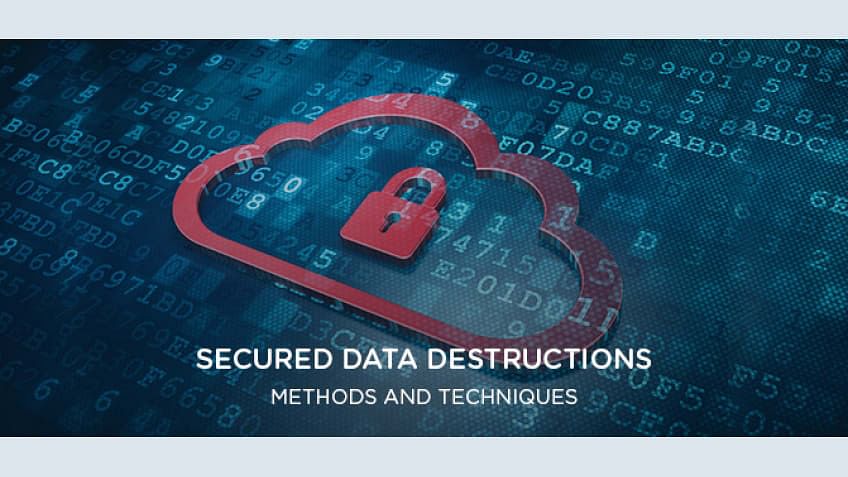The Influence of Effective Data Destruction on Cyber Security Danger Monitoring
The Influence of Effective Data Destruction on Cyber Security Danger Monitoring
Blog Article
The Vital Nature of Information Damage in Upholding Computer System Safety And Security Services and Protecting Against Unauthorized Gain Access To
In an era where information violations and identity theft are progressively prevalent, the importance of effective information destruction can not be overemphasized. Organizations has to recognize that the failure to effectively deal with sensitive details poses not only legal and economic dangers however also a possible disintegration of client trust. Various approaches, from data cleaning to physical destruction, offer as crucial safeguards versus unapproved gain access to. Nonetheless, recognizing the implications of information destruction techniques and conformity with guidelines elevates necessary inquiries concerning the competence of current techniques and their lasting practicality despite progressing risks.
Significance of Data Damage
In a progressively digital world, the significance of data devastation can not be overemphasized. As organizations collect large amounts of sensitive details, the prospective repercussions of falling short to correctly get rid of and take care of of that information become significantly severe. Information breaches, identification burglary, and corporate espionage pose significant hazards, emphasizing the necessity of reliable information damage methods.

Furthermore, as technology advances, so too do the approaches through which malicious stars look for to exploit delicate info. Organizations needs to stay proactive and attentive in their information destruction methods to protect against these advancing hazards. By focusing on information devastation, firms not only secure their assets but likewise foster trust fund amongst customers and stakeholders, showing a commitment to responsible information monitoring and protection methods.
Methods of Effective Information Devastation
To guarantee the irreversible and total damage of delicate information, organizations can employ a range of reliable approaches customized to their details demands. Among one of the most common approaches is data wiping, which entails using specialized software application to overwrite existing data several times, making recovery virtually impossible. This is specifically valuable for solid-state drives and difficult drives, where conventional removal techniques are poor.
One more reliable strategy is degaussing, which makes use of strong electromagnetic fields to interrupt the magnetic domain names on storage space media, providing the information irretrievable. This technique is especially fit for magnetic storage devices, such as tape drives and tough disks.
Physical damage is likewise a viable option, including the shredding, crushing, or incineration of storage devices. This method assurances that information can not be recouped, making it suitable for companies taking care of highly sensitive information.

Conformity With Information Protection Regulations
Organizations have to not only concentrate on efficient data damage techniques however also make certain compliance with data protection guidelines that govern how delicate information is handled and thrown away. Following these laws is vital for keeping and securing personal data consumer trust. Regulations such as the General see page Data Security Guideline (GDPR) in the European Union and the Health Insurance Transportability and Responsibility Act (HIPAA) in the United States impose stringent standards on data administration, which include demands for the safe disposal of sensitive info.
To attain compliance, companies need to carry out detailed data damage policies that line up with these legal structures. This includes determining data that needs devastation, establishing procedures for secure methodsâEUR" such as shredding physical media or making use of software application that satisfies sector requirements for data wipingâEUR" and keeping thorough records of destruction tasks. Normal audits ought to be carried out to ensure adherence to these plans and to determine any type of potential areas for renovation.
Failure to conform with information security policies can lead to considerable lawful implications, including substantial penalties and damage to a company's reputation. As a result, incorporating compliance right into data devastation practices is not only a legal obligation however also a critical part of a robust information safety method.
Repercussions of Poor Data Handling
Poor data handling can cause serious consequences that prolong past instant operational obstacles. Organizations might face substantial monetary losses as a result of information breaches, which usually lead to pricey remediation efforts, lawful fees, and regulatory penalties. These economic ramifications can hinder and strain sources development, inevitably impacting a company's bottom line.
Furthermore, inadequate information handling can seriously harm an organization's track record. Partners, consumers, and stakeholders might shed count on in an entity that falls short to secure sensitive information, causing decreased client loyalty and prospective loss of company opportunities. This disintegration of trust fund can take years to rebuild, if it can be recovered in any way.
Additionally, organizations might encounter legal implications occurring from non-compliance with data defense guidelines. Such infractions may lead to examinations and charges, intensifying the financial concern and additional tarnishing the organization's picture.
In the world of cybersecurity, poor data management methods can produce vulnerabilities that make systems a lot more at risk to top article unauthorized access and cyberattacks. Inevitably, these effects underscore the essential relevance of carrying out durable information taking care of procedures to protect delicate information and preserve organizational stability.
Finest Practices for Secure Information Disposal


To start with, information need to be categorized according to its level of sensitivity. Sensitive details needs more extensive disposal approaches, such as shredding physical records and making use of sophisticated software application for electronic data cleaning. Utilizing certified information damage services ensures compliance with market laws and standards.
Second of all, organizations must carry out a data disposal plan that mandates routine audits. This policy ought to lay out the procedures for data retention and devastation, making certain that obsolete information is dealt with promptly and firmly. Training employees on these methods is crucial to promoting a society of security understanding.
Lastly, maintaining thorough documents of disposed data enhances responsibility and gives a clear audit route. This paperwork must consist of the type of information ruined, the method made use of, and the day of disposal.
Verdict
Taking on durable methods such as information cleaning, degaussing, and physical damage, along with conformity with policies like GDPR and HIPAA, is necessary for protecting delicate details. Neglecting correct information disposal practices can lead to severe consequences, consisting of data violations and legal effects.
In an era where information violations and identity burglary are progressively widespread, the significance of efficient data devastation can not be overemphasized. data destruction. Information violations, identity theft, and company reconnaissance pose substantial dangers, highlighting the necessity of efficient data damage methods
Conformity with policies such as GDPR and HIPAA mandates that organizations apply stringent data security procedures, including the secure devastation of data at the end of its lifecycle.
By focusing on data destruction, companies not only protect their assets however likewise foster trust fund amongst clients and stakeholders, demonstrating a dedication to liable information administration and security techniques.
Organizations should not only focus on effective data damage approaches yet also ensure compliance with data defense regulations that govern exactly how delicate details is handled and disposed of.
Report this page